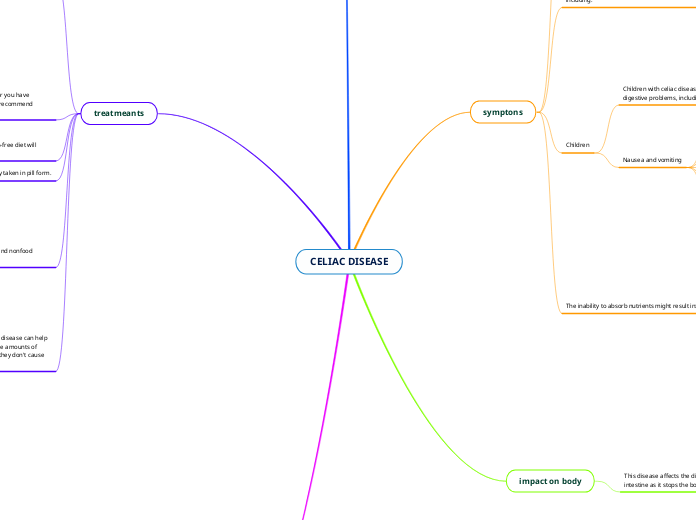CELIAC DISEASE
backround information
Modified food starch, preservatives and food stabilizers
Prescription and over-the-counter medications
Lipstick products
Vitamin and mineral supplements
Play dough
Envelope and stamp glue
Communion wafers
Herbal and nutritional supplements
Refractory celiac disease
If you have refractory celiac disease, your small intestine won't heal.
Then you'll likely need to be evaluated in a specialized center.
Refractory celiac disease can be quite serious, and there is currently no proven treatment.
Celiac disease is a chronic digestive and immune disorder that damages the small intestine.
It’s an autoimmune disease that is caused when you eat gluten and when you have celiac disease, gluten spurs your immune system to attack the small intestine.
This disease is triggered by eating foods that contain gluten; this can cause long-lasting digestive problems and can keep you from getting all the nutrients your body needs.
Toothpaste and mouthwash
treatmeants
A dietitian who works with people with celiac disease can help you plan a healthy gluten-free diet. Even trace amounts of gluten in your diet can be damaging, even if they don't cause signs or symptoms.
Gluten can be hidden in foods, medications and nonfood products, including:
If your anemia or nutritional deficiencies are severe, your doctor or dietitian might recommend that you take supplements, including:
Zinc
Vitamin K
Vitamin D
Vitamin B-12
Iron
Folate
Copper
Vitamins and supplements are usually taken in pill form.
vitamins, your doctor might give them by injection.
For most people with celiac disease, a gluten-free diet will allow the small intestine to heal.
For children, that usually takes three to six months.
For adults, complete healing might take several years.
If your small intestine is severely damaged or you have refractory celiac disease, your doctor might recommend steroids to control inflammation.
Other drugs, such as azathioprine (Azasan, Imuran) or budesonide (Entocort EC, Uceris), might be used
Steroids can ease severe signs and symptoms of celiac disease while the intestine heals.
A strict, lifelong gluten-free diet is the only way to manage celiac disease. Besides wheat, foods that contain gluten include:
Removing gluten from your diet will gradually reduce inflammation in your small intestine, causing you to feel better and eventually heal. Children tend to heal more quickly than adults.
Barley
Durum
Spelt (a form of wheat)
Semolina
Rye
Malt
Graham flour
Farina
Triticale
Bulgur
diagnosis
Capsule endoscopy. This test uses a tiny wireless camera to take pictures of your entire small intestine. .
The camera sits inside a vitamin-sized capsule, which you swallow
As the capsule travels through your digestive tract, the camera takes thousands of pictures that are transmitted to a recorder
Two blood tests can help diagnose it:
Serology testing looks for antibodies in your blood. Elevated levels of certain antibody proteins indicate an immune reaction to gluten.
It's important to be tested for celiac disease before trying a gluten-free diet. Eliminating gluten from your diet might make the results of blood tests appear normal.
enetic testing for human leukocyte antigens (HLA-DQ2 and HLA-DQ8) can be used to rule out celiac disease.
If the results of these tests indicate celiac disease, your doctor will likely order one of the following tests:
Endoscopy. This test uses a long tube with a tiny camera that's put into your mouth and passed down your throat (upper endoscopy).
The camera enables your doctor to view your small intestine and take a small tissue sample (biopsy) to analyze for damage to the villi.
impact on body
This disease affects the digestive system mainly the small intestine as it stops the body from taking nutrients.
Over time, this reaction damages your small intestine's lining and prevents it from absorbing some nutrients
T cells found in the bowel are normally protective “tissue-healing” cells.
However, in those with celiac disease, T cells produce inflammation when exposed to gluten.
The muscles of the small intestine mix food with the juices from the liver,pancreas,and intestine and push the mixture forward for further digestion.
The walls of the small intestine absorb water and the digested nutrients into your bloodstream.eating gluten triggers an immune response in your small intestine.
. This inflammation causes damage to the lining of the bowel and produces the acute symptoms that patients experience when they ingest gluten
symptons
The inability to absorb nutrients might result in:
Neurological symptoms, including attention-deficit/hyperactivity disorder (ADHD), learning disabilities, headaches, lack of muscle coordination and seizures
Delayed puberty
Short stature
Irritability
Anemia
Damage to tooth enamel
Failure to thrive for infants
Children
Pale, foul-smelling stools
Gas
Swollen belly
Chronic diarrhea
Children with celiac disease are more likely than adults to have digestive problems, including:
However, more than half the adults with celiac disease have signs and symptoms unrelated to the digestive system, including:
Itchy, blistery skin rash (dermatitis herpetiformis)
Reduced functioning of the spleen (hyposplenism
Joint pain
Nervous system injury, including numbness and tingling in the feet and hands, possible problems with balance, and cognitive impairment
Headaches and fatigue
Mouth ulcers
Loss of bone density (osteoporosis) or softening of bone (osteomalacia)
Anemia, usually from iron deficiency
The signs and symptoms of celiac disease can vary greatly and differ in children and adults. Digestive signs and symptoms for adults include:
Diarrhea
Fatigue
Weight loss
Nausea and vomiting
Constipation
Abdominal pain
Bloating and gas

